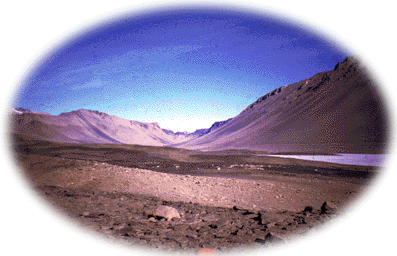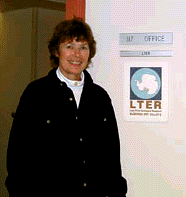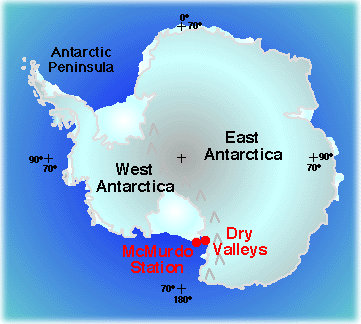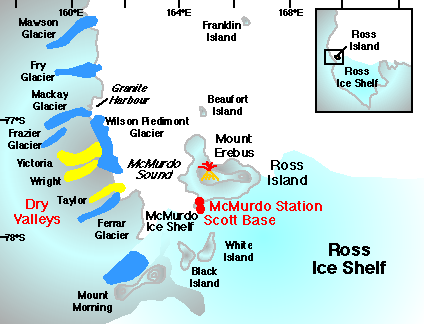I am a Biology Teacher at Lakeside School in Seattle Washington. This
field season, I am going to the dry polar desert in the Taylor
Valley, Victoria Land, Antarctica where I will join the Long Term Ecological
Research (LTER) team to study the ecosystem of the perennially
ice covered fresh water lakes. Can you imagine those critters living in
a place where they receive no light for several months of the year, and
when light becomes available, it must penetrate up to 6 meters of ice!
Who lives there? How do they earn their living? Who eats whom? Where
do they live? How long do they live? What is the water like when it has
been covered by so much ice for so long? What happens to the oxygen produced
by the photosynthesizing organisms? How long have these organisms been isolated?
Are they significantly different from fresh water organisms that we find
in ponds and lakes at home in Seattle? Can we see evolution in progress?
 I love talking with research scientists. I like to know about the kinds
of questions they are studying and how they find answers. I like to see
the labs in which they work and I always want to get my hands on the lab
equipment. I have learned that all I have to do is ask and most scientists
are willing to share their research. The Teachers Experiencing Antarctica
program is about sharing research and teaching experience.
I love talking with research scientists. I like to know about the kinds
of questions they are studying and how they find answers. I like to see
the labs in which they work and I always want to get my hands on the lab
equipment. I have learned that all I have to do is ask and most scientists
are willing to share their research. The Teachers Experiencing Antarctica
program is about sharing research and teaching experience.
I am married to Wally (a business man), have a Bernese Mountain dog and
a horse. I enjoy horseback riding (dressage and three day eventing), skiing,
hiking and camping. As you can tell, I am an outdoor sort of person. While
outside, there are always so many things to wonder about that I am always
busy thinking about "science" things. I am also always looking
for ways to find exciting experiences. I have been a science teacher for
a long time. In fact, some of my friends have called me a science junkie.
I guess that is because I always what to know "why did this happened?
"or "I wonder what would happen if?" or "how is it possible
that?" My motto: This is not a dress rehearsal, life is meant to be
lived - so do it! I believe that it is possible to set high goals and achieve
anything that you really set your mind on, thus, I am lucky enough to be
a teacher experiencing Antarctica and will share the experience with you.
I will be writing daily, though I do not know how often I will have access
to electronic mail. I will be in a remote field camp most of the time. I
will send pictures and my journals about my experiences "on the ice"
when I get the chance - so keep checking back to my journal page to see
how the research in Taylor Valley is progressing!

McMurdo Dry Valleys: A Cold Desert Ecosystem
I have an educational outreach project with two parts; first to create
opportunities for teachers and students to collaborate with Antarctic
Support Associates employees; second to work with the McMurdo Dry Valley
Long Term Ecological Research on the schoolyard LTER as part of their
educational outreach program.
MISSION:
1. To promote a greater understanding of Antarctica and Antarctic
science research by teachers and their students through e-mail collaboration
with ASA personnel.
2. To offer collaborative opportunities for student
parcticipation in ongoing research through the LTER program with the Dry
Valleys watershed study.
GOALS:
- Promote understanding of the nature of science by the population with whom
ASA personnel communicate via e-mail
- Promote NSF/EHR/ESIE/OPP program goals
- Make Antarctica more accessible to a larger population
- Broadly distribute some of the knowledge generated by NSF funded Research
such as the LTER in the dry valleys
- Network people for a synergistic effect
- Create a direct line of communication between students and ASA personnel
With my colleague, Pete Amati, I received an NSF support to facilitate a
workshop to create collaborative opportunities for Antarctic Support
Associates personnel who are comfortable using e-mail while on the ice. ASA
employees work to support the science research and hold a wide variety of
jobs including carpenters, firemen, cooks, truck drivers, helicopter pilots,
communications operators, etc. There are approximently twice as many ASA
employees as scientist.
As TEA fellows, we both spent time during a field season on the ice with
research teams. Teachers Experiencing Antarctica and the Arctic (TEA) is a
NSF/EHR/ESIE/OPP sponsored program that selects several teachers each year
to join a research team doing polar research. From our direct experience, we
know the value and excitement among teachers and students resulting from
their contact with enthusiastic people living and working in Antarctica.
There is a growing demand to make use of electronic communication and web
based information as a part of K-12 education. There is also an increasing
call for collaboration between schools and communities of adults from a wide
variety of occupations. As more and more schools gain access to computer
technology, students will make more and better use of the web and e-mail. As
teachers, you are in the unique position to be able to share your classes
with ASA employees who are living and working on the ice. We will
facilitate a workshop with ASA employees during November 1999 and offer
names of teachers as collaborative partners when they sign on with us.
Peter and Barb offered an opportunity for teachers to
- Collaborate with an ASA employee who wishes to work with teachers
- Share the e-mail from Antarctica with your students
- Send student questions and requests for information
- Engage students in thinking about polar research and what might be learned
- Engage students in thinking about what life might be like when living on
the ice
- Parcticipate the entire field season with your colleague.
- Agree to parcticipate in an evaluation at the end of the season by
answering a short e-mail questionnaire. Numbers are an important
consideration in any investment.
Parcticipants completed a survey to indicate their willingness to work with
an ASA employee. ASA employee volunteers also completed a survey and have
offered to work with teachers and students during their stay on the ice.
Contact Barb Schulz at this address barb.schulz@lakesideschool.org for
further information or with questions.
For the schoolyard LTER, I will be working with Kathy Welch and Carmen Nezat
to create a web link for other schools to access our data. I will be going
to the Lake Hoare field camp in the Taylor Valley to collect data on some of
the streams using the same equipment the we use at Lakeside School in
Seattle. You can find the schoolyard LTER link on the web at this site
http://www.geo.ua.edu/lyonsden/schoolyard-LTER/
Polar Classroom Activities:
Life in Extreme Environments
Introduction
Anhydrobiosis
Lakes
Under Ice
Top
of the Food Chain
Dissolved Oxygen and Aquatic Net Primary Productivity
Photosynthetically Available Radiation (PAR) Measurements
Part 1. Calculating The Solar Constant Using A TI-8*
Part 2. Measure available radiation at your water testing site

Barb Schulz will begin her Antarctic journey at McMurdo
Station.

The Dry Valleys (yellow) host unique ecosystems!

